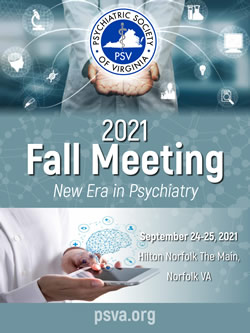Summer 2021 Issue |
|
Telemedicine in Virginia & Beyond
By William L. Harp, MD, DLFAPA
Executive Director
Virginia Board of Medicine
Telemedicine has been around for decades as a means to enhance access to medical services in remote, underserved areas. It is a convenient, cost-effective method to diagnose and treat lower acuity conditions, to monitor chronic illnesses, and to provide much-needed specialty consultation. Some specialties are particularly well suited to telemedicine including radiology, dermatology, psychiatry and others. I hope the following points are helpful to you.
Site of Practice and Licensure
The Virginia Board of Medicine, like all other boards of medicine in the US, considers the site of practice to be where the patient is located. This means that for a physician to provide medical services to a Virginia resident, the physician must hold a license with the Virginia Board. This includes out-of-state physicians who wish to provide medical services into Virginia. And since all states view the site of practice to be where the patient is, any Virginia physician who wishes to provide services to residents in another state must hold a license in that state. A handful of boards of medicine issue a telemedicine license rather than a full medical license. The Virginia Board of Medicine has consistently voted not to issue a separate telemedicine license, but rather to require a full license.
An exception to “interstate” telemedicine licensure exists for physicians in Federal systems, such as the Veterans Health Administration. Since the physicians are in a Federal system, on Federal property, treating patients of the system, only a single state license to practice is required. Physicians at the Hampton VAMC, McGuire VAMC and Salem VAMC do not need to have a Virginia license unless they wish to treat Virginia residents outside the Federal system. Several years ago, Federal rules authorized physicians in Federal systems to provide telemedicine services to patients of the system regardless of the location of the physician and the location of the patient.
Standard of Care
The mission of the Board of Medicine is the protection of the public. Therefore, it expects the same standard of care in telemedicine as the patient would receive if being seen in-person. The Board also expects that patients who are inappropriate for telemedicine be referred for an in-person visit at a hospital ER, an urgent care, or with their primary care provider or a specialist. The Board’s Guidance Document on Telemedicine 85-12 speaks to these issues and more. It has recommendations for Informed Consent, Identification of the Patient, Medical Records, Privacy/Security/Exchange of Information, etc. The link to the document is included at the end of this article.
Prescribing
As all know, the foundation for prescribing in the Commonwealth of Virginia is the bona fide doctor-patient relationship. The elements to establish the relationship are in Board of Pharmacy law, Section 54.1-3303 of the Code of Virginia. The elements include a review of the patient’s medical and drug history, provision of information to the patient about the risks and benefits of any drug prescribed, an examination of the patient in-person or by technology, including medical records and imaging studies, and plans for follow-up or referral.
Code Section 54.1-3303 speaks further and specifically to telemedicine. A bona fide doctor-patient relationship can be established by face-to-face interactive, two-way, real-time communication services or store and forward technologies if all of the following conditions are met. There must be an updated medical history at the time of prescribing, performance of a physical examination if indicated, a proper diagnosis, ordering of diagnostic testing if indicated, ensuring that the standard of care is met for the patient considering condition and age, and that Federal and State laws and regulations governing prescribing are met. A Virginia medical license authorizes a physician to prescribe Schedule VI’s. Antidepressants and antipsychotics are Schedule VI drugs.
Prescribing Schedule II-V Drugs
However, to prescribe Schedule II-V drugs, a physician must be registered with the Drug Enforcement Administration (DEA). Psychiatrists commonly prescribe stimulants (Schedule II), benzodiazepines (Schedule IV) and other drugs that require a DEA registration. Generally, telemedicine prescribing of Schedules II-V is predicated upon an initial in-person visit. However, the COVID-19 pandemic has created an exception to the in-person rule. As of March 16, 2020, and continuing for as long as the HHS Secretary’s designation of a public health emergency remains in effect, DEA-registered practitioners in all areas of the United States may issue prescriptions for Schedule II-V controlled substances to patients for whom they have not conducted an in-person medical evaluation, provided all of the following conditions are met:
- The prescription is issued for a legitimate medical purpose by a practitioner acting in the usual course of his/her professional practice;
- The telemedicine communication is conducted using an audio-visual, real-time, two-way interactive communication system; and
- The practitioner is acting in accordance with applicable Federal and State laws.
And for the duration of the pandemic, HHS is relaxing enforcement of the requirement that telemedicine be conducted on HIPAA-compliant platforms. As long as there is “good faith” provision of telemedicine services, audio-visual applications such as Apple Face Time, Facebook Messenger video chat, Google Hangouts video, Zoom or Skype may be used. As far as I can gather, when the pandemic ends, the in-person initial visit and HIPAA-compliant platforms will again become the order of the day.
Patient and Physician Assessments of Telemedicine
The need to access medical services during COVID-19 has led to an expansion of telemedicine and great acceptance by patients and physicians. An AMA survey indicates that 79% of patients were very satisfied with the care, and 81% said the physician was thorough. 73% of patients said they will continue to use telehealth services in the future. The top three services that physicians want to be able to provide after the pandemic is over are chronic disease management, medical management, and care coordination. Becker’s Hospital Review reports that 65% of healthcare leaders are facilitating a shift toward virtual care offerings, and 89% are investing in telehealth.
We do not know what the landscape of telemedicine will be after the COVID-19 pandemic ends, but all indications are that its significance in the practice of medicine will continue to grow.
The following resources are recommended to your reading. There are details in them that are not addressed in the text above.
https://www.dhp.virginia.gov/media/dhpweb/docs/med/guidance/85-12.pdf
https://lis.virginia.gov/cgi-bin/legp604.exe?212+ful+CHAP0302
https://lis.virginia.gov/cgi-bin/legp604.exe?212+ful+CHAP0301
https://www.hhs.gov/hipaa/for-professionals/special-topics/emergency-preparedness/notification-enforcement-discretion-telehealth/index.html
https://www.deadiversion.usdoj.gov/coronavirus.html
YOUR NEWSLETTER IS NOW AVAILABLE ON YOUR SMARTPHONE AND TABLET!
JOIN PSV TODAY!
PLAN NOW!
PSV 2021
FALL MEETING
September 24-25, 2021
Hilton
Norfolk The Main
Norfolk, VA
APA Find a Psychiatrist
Are you accepting new patients?
Opt into APA’s Find A Psychiatrist database. To view the functionality or opt-in,
CLICK HERE
FYI: A link for this option has been added to the PSV website. Select the About button and then Find a Psychiatrist from the drop down.




